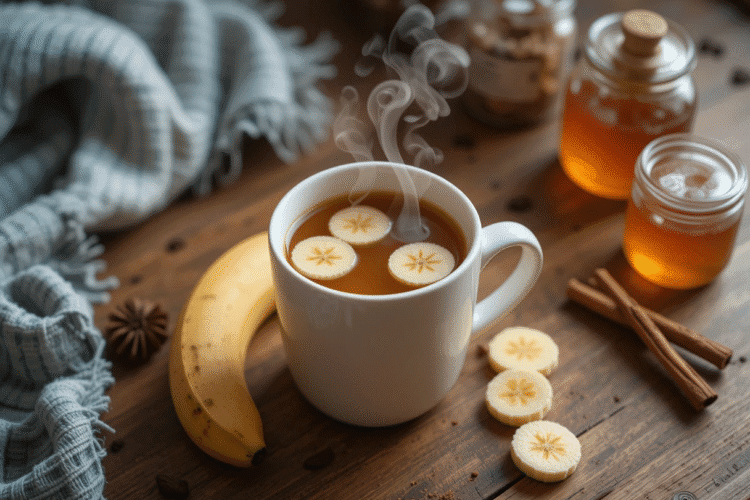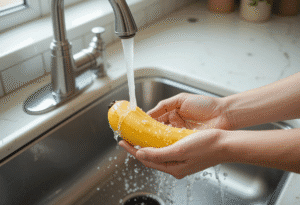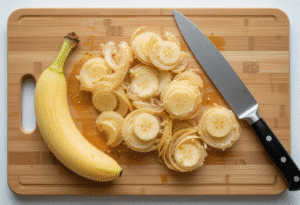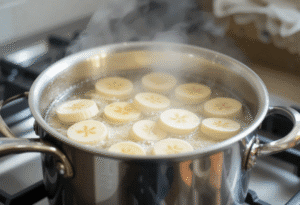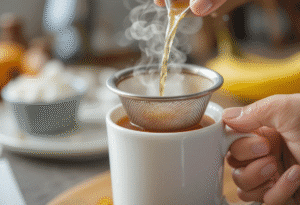Looking for a natural way to sleep better, manage weight, and stay energized—without caffeine? Banana tea might be your answer. Made from boiled banana (with peel!), this nutrient-packed drink is rich in potassium, magnesium, and fiber. Learn how to make banana tea at home, explore its science-backed benefits, and find out why it’s becoming a student wellness staple.
What is Banana Tea Recipe?
Banana tea is a caffeine-free, naturally sweet drink made from whole bananas, including the peel. As a dietitian, I’ve tried making this tea during busy workweeks and found it a soothing, budget-friendly option for students. You can enjoy it hot or cold, making it a versatile addition to your day.
Why is Banana Tea Good for You?
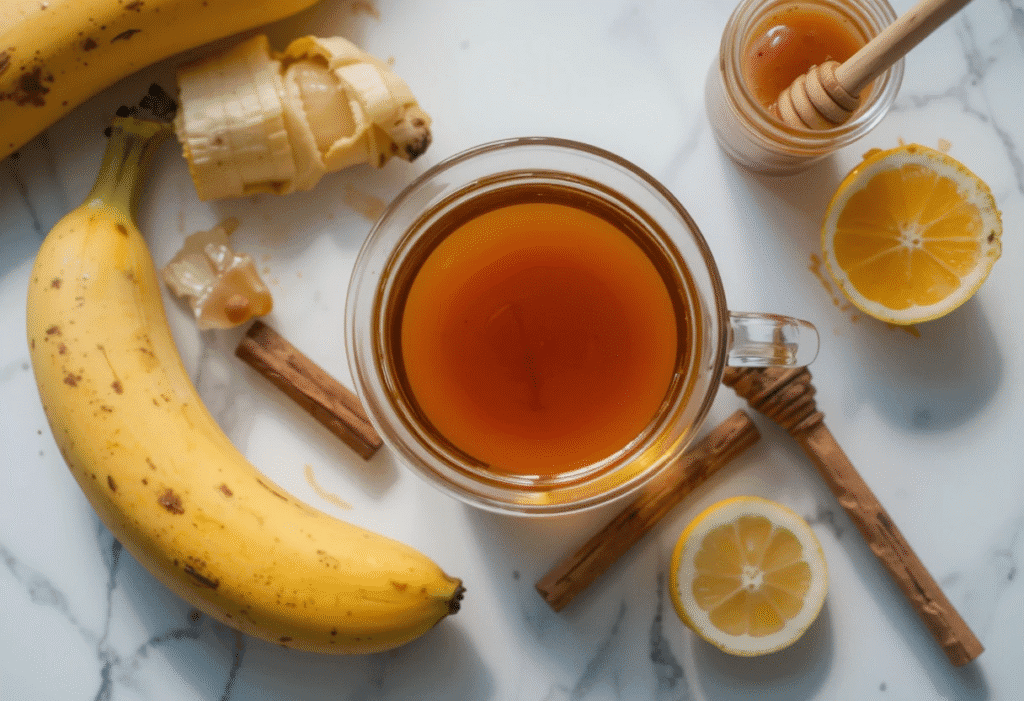
Banana tea offers several potential health benefits, supported by nutritional science. Here’s what research says:
- Supports Heart Health
Bananas are rich in potassium, which helps regulate blood pressure and supports heart function. According to the American Heart Association, adequate potassium intake may reduce the risk of hypertension (AHA, 2020). Magnesium in bananas also supports cardiovascular health. - Promotes Better Sleep
Bananas contain tryptophan, an amino acid that contributes to serotonin production, which may aid relaxation and sleep. Magnesium and potassium help relax muscles and nerves, potentially improving sleep quality (National Institutes of Health, 2021). - Aids Digestion
The dietary fiber in banana peels supports healthy digestion by promoting regular bowel movements and feeding beneficial gut bacteria (USDA, 2023). Fiber acts like a natural cleanser for your digestive tract. - Provides Antioxidants
Banana peels contain polyphenols, antioxidants that help reduce oxidative stress by neutralizing free radicals, potentially lowering the risk of chronic diseases (Journal of Food Science, 2018). - Supports Mood
Tryptophan in bananas may support serotonin production, which can positively influence mood, according to research from the NIH (2021). This can help students manage stress during exams. - Aids Weight Management
With only 20-30 calories per cup (depending on banana size), banana tea is a low-calorie alternative to sugary drinks. Its fiber content promotes satiety, potentially reducing cravings for unhealthy snacks.
Nutritional Content of Banana Tea
Based on USDA FoodData Central (2023), here’s the approximate nutritional profile for one cup of banana tea (made from one medium banana, ~120g, with peel):
| Nutrient | Amount | Role |
| Calories | 20-30 kcal | Low-calorie energy source |
| Carbohydrates | 5-7 g | Provides energy |
| Fiber | 1-2 g | Supports digestion |
| Sugars | 3-5 g | Natural sweetness |
| Protein | 0.5-1 g | Minimal; supports body functions |
| Fat | 0 g | No contribution to calories |
| Potassium | 250-350 mg | Supports heart and muscle function |
| Magnesium | 15-25 mg | Supports over 300 bodily functions |
| Vitamin B6 | 0.1-0.2 mg | Supports brain and immune health |
Note: Values vary based on banana size and preparation (e.g., added honey). Data is estimated from USDA nutrient profiles for whole bananas, as specific banana tea studies are limited.
How to Make Banana Tea
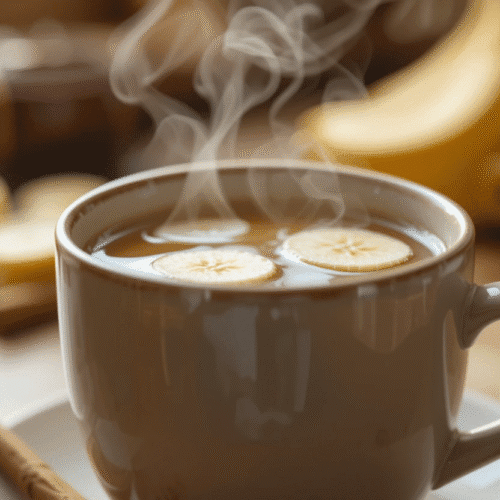
Banana Tea Recipe
Ingredients
- 1 organic banana with peel, washed
- 2 cups filtered water
- 1 tsp honey optional
- ½ tsp cinnamon or a squeeze of lemon juice optional
Instructions
- Scrub the banana under running water to remove dirt or residue.

- Cut off both ends and slice the whole banana (with peel) into ½-inch rounds.

- Bring 2 cups of filtered water to a boil in a small pot.
- Add banana slices to the boiling water.

- Reduce heat and simmer for 10–15 minutes.
- Strain the tea into a mug using a fine mesh strainer; discard solids.

- Add honey, cinnamon, or lemon juice (optional) for flavor.
- Serve hot or chill in the fridge for an iced version.
Notes
- Use organic bananas to avoid pesticide exposure from the peel.
- Add pineapple juice and coconut for a tropical twist.
- Store leftover tea in the fridge for up to 24 hours.
- Microwave version: Use a microwave-safe bowl to steep banana slices in hot water.
Easy Recipe for Students
What You Need:
- 1 organic banana (with peel, to avoid pesticides)
- 2 cups filtered water
- 1 tsp honey (optional, for sweetness)
- ½ tsp cinnamon or a squeeze of lemon juice (optional, for flavor)
- Small pot, strainer, and mug
Steps:
- Wash the Banana: Scrub the organic banana under running water to remove dirt.
- Prepare the Banana: Cut off the ends and slice the whole banana (peel included) into ½-inch pieces.
- Boil Water: Bring 2 cups of water to a boil in a small pot.
- Add Banana: Add banana slices to the boiling water.
- Simmer: Reduce heat and simmer for 10-15 minutes to extract nutrients.
- Strain: Pour the liquid through a fine mesh strainer into a mug, discarding solids.
- Flavor (Optional): Stir in honey, cinnamon, or lemon juice for taste.
- Serve: Enjoy hot or refrigerate for a refreshing iced tea.
Dorm-Friendly Tip: If you don’t have a stove, use a microwave-safe container to heat water and banana slices for 2-3 minutes, then steep for 10 minutes before straining.
Does Banana Tea Help with Weight Loss?
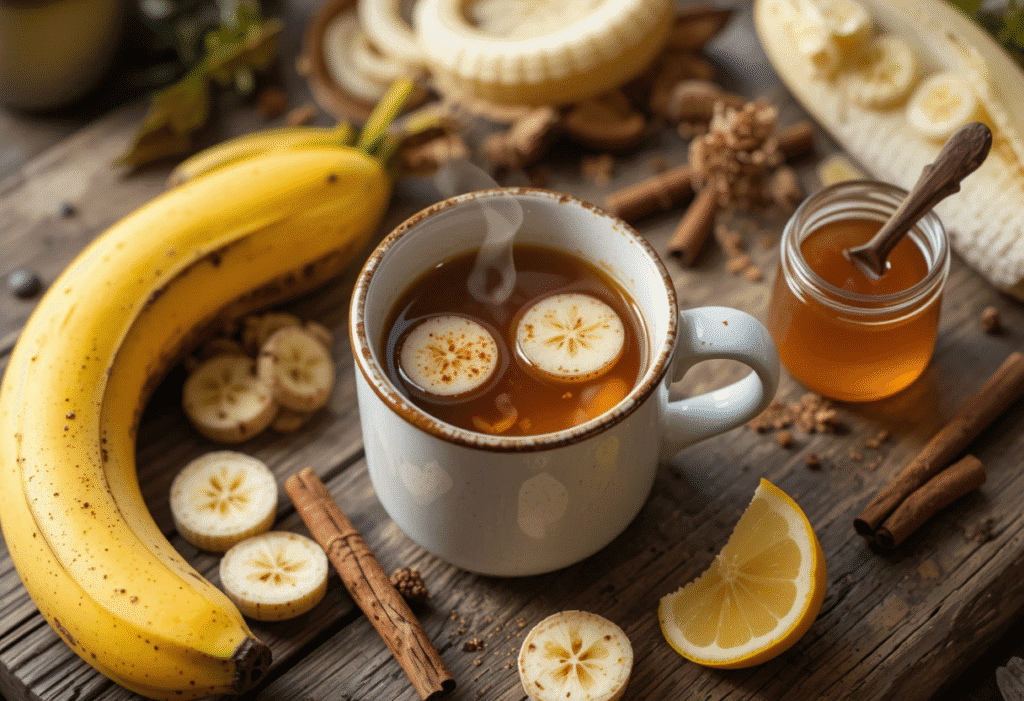
Banana tea can support weight management as part of a balanced diet, but it’s not a magic solution. If you’re looking for more banana-based options, check out this 3 Ingredient Banana Weight Loss Recipe That Actually Works — it’s simple, filling, and designed to boost fat loss naturally.
Here’s how it helps:
- Low Calories: 20-30 calories per cup, compared to 100+ in sugary sodas.
- Satiety: Fiber helps you feel full, reducing snacking.
- Hydration: Proper hydration supports metabolism (Mayo Clinic, 2022).
- Stress Reduction: Less stress may reduce emotional eating.
For weight loss, combine banana tea with healthy eating and regular exercise. Consult a dietitian for personalized advice.
Benefits for Digestion
Banana tea supports digestive health through:
- Fiber: Promotes regular bowel movements (USDA, 2023).
- Prebiotics: Feed beneficial gut bacteria, supporting gut health.
- Electrolytes: Potassium and magnesium help maintain fluid balance.
- Gentle Ingredients: Soothes mild stomach discomfort.
Potential Side Effects
Banana tea is generally safe, but may cause:
- Drowsiness: Tryptophan and magnesium may make you feel relaxed.
- Increased Urination: High potassium can act as a diuretic.
- Digestive Changes: Added fiber may cause temporary bloating.
Who Should Be Cautious?
- People on Blood Pressure Medications: Potassium may interact with drugs like ACE inhibitors. Consult your doctor.
- Individuals with Kidney Issues: Excess potassium can be harmful; seek medical advice.
- Allergies: Rare banana allergies may cause reactions.
- New Users: Start with ½ cup to assess tolerance.
When to Drink Banana Tea

Best Times:
- Evening: 30-60 minutes before bed to promote relaxation.
- Post-Workout: Replenishes potassium and magnesium lost through sweat.
- Between Meals: Curbs cravings for unhealthy snacks.
Recommended Amount: 1-2 cups daily to avoid excessive potassium intake.
Tips for the Best Banana Tea
- Use organic bananas to avoid pesticides on the peel.
- Use filtered water for a cleaner taste.
- Store tea in the fridge for up to 24 hours; discard after to avoid spoilage.
- Limit added sweeteners to maintain low calories.
- Experiment with flavors like cinnamon or ginger.
Fun Variation: Tropical Banana Tea
For a student-friendly twist, try this tropical version:
- Ingredients: 1 organic banana, 2 cups water, 1 tbsp pineapple juice, ½ tsp shredded coconut.
- Steps: Follow the standard recipe, adding pineapple juice and coconut after straining.
- Why It’s Great: Adds a refreshing flavor, perfect for hot days or study sessions.
The Bottom Line
Banana tea is a nutritious, low-cost drink that supports heart health, digestion, and sleep when part of a balanced lifestyle. As a dietitian, I recommend it as a healthy alternative to sugary drinks, especially for students on a budget. Combine it with a varied diet and exercise for the best results. Always consult a healthcare professional before making dietary changes, especially if you have health conditions.
Looking for other natural drink hacks? Check out the Salt Trick for Men Recipe — a trending wellness drink that may support metabolism and hydration.
Key Takeaways
- Banana tea is a caffeine-free, nutrient-rich drink.
- Supports heart health, sleep, digestion, and mood.
- Low-calorie and student-friendly.
- Easy to make with minimal equipment.
- Safe in moderation (1-2 cups daily) for most people.
- Consult a doctor if you have medical conditions or take medications.
Frequently Asked Questions (FAQs)
Is banana tea safe for kids?
Yes, it’s generally safe as a caffeine-free drink. Start with small amounts (½ cup) to ensure no digestive discomfort.
Can I drink banana tea daily?
Yes, 1-2 cups daily is safe for most people. Avoid excess due to potassium content, and consult a doctor if you have kidney issues.
Does banana tea help with weight loss?
It supports weight management by being low-calorie and satiating, but weight loss requires a balanced diet and exercise.
Why use organic bananas?
Organic bananas reduce exposure to pesticides on the peel, which is used in the tea.
Can I make banana tea without the peel?
Yes, but you’ll miss extra fiber and antioxidants. The peel enhances nutritional value.
How long does banana tea last?
Up to 24 hours in the fridge. Discard if it smells off or develops mold.
Will banana tea make me sleepy?
It may promote relaxation due to tryptophan and magnesium, making it ideal before bed.
Can I add sugar?
Use a small amount of honey for sweetness to keep it healthy. Avoid refined sugar.
What if I don’t like the taste?
Try adding cinnamon, lemon, or pineapple juice, or serve it iced for a different flavor.
Is the banana tea recipe better than eating a banana?
Both are nutritious. Tea uses the peel for added fiber and antioxidants, while eating bananas is more filling.
Can I drink banana tea if I take medication?
Check with your doctor, especially if you take blood pressure or kidney-related medications, as potassium may interact.
Can I make banana tea in a dorm?
Yes, use a microwave to heat water and banana slices, then steep and strain. No stove needed
Sources
- American Heart Association (AHA). (2020). Potassium and High Blood Pressure. Retrieved from heart.org.
- National Institutes of Health (NIH). (2021). Magnesium and Tryptophan in Sleep Regulation. Retrieved from ods.od.nih.gov.
- USDA FoodData Central. (2023). Nutrient Database for Bananas. Retrieved from fdc.nal.usda.gov.
- Journal of Food Science. (2018). Antioxidant Properties of Banana Peels. DOI: 10.1111/1750-3841.14122.
- Mayo Clinic. (2022). Hydration and Weight Management. Retrieved from mayoclinic.org.
Try making banana tea tonight for a healthy, affordable drink that fits your student lifestyle!
By Sarah Thompson, Registered Dietitian
Disclaimer: Always consult a healthcare professional before making dietary changes, especially if you have medical conditions (e.g., kidney issues) or take medications like blood pressure drugs. The information in this article is for educational purposes and not a substitute for medical advice.
